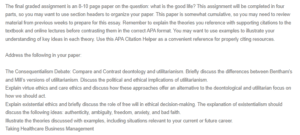The Good Life – The Consequentialism Debate
Utilitarianism revolves around the ‘end justifies the means‘ concept. Jeremy Bentham and Stuart Mill came up with the theory and posited that the result outcomes of a given action are of greater value in comparison to the latter (Mill, 2016). The theory also asserts that the most ethical thing that one can do is to take advantage of happiness so that society can gain an advantage of one’s actions. Hence, utilitarianism is dependent on consequentialism (Mill, 2016). In healthcare, utilitarianism is present in areas such as euthanasia and orders of ‘Do Not Resuscitate.’ Although subject to criticism, the philosophy underlying the aforementioned cases is dependent on the recipient. The utilitarianism theory is selfish in nature because it leans towards judgments that are ideal to the philosopher (Mulgan, 2014).
Deontology, on the other hand, is a moral theory that depends on the Scriptures, referring to intuition, moral laws, and rules. The theory was coined by Immanuel Kant, and it uses the moral code to judge whether an action is wrong or right. The consequences of a person’s actions are not considered. When one does right, they are essentially following the rules of the letter, thus promoting equality and fairness (Misselbrook, 2013). Deontology points out that the morality of actions has more weight and that the results of wrong actions are not the same as the outcome. An example in healthcare is when the lives of a mother and child are both at risk, and the doctors are faced with the decision to terminate one life to save the other. Saving both would be the best option, but deontology allows for fairness and takes a moral approach; hence, saving one life does not make sacrificing the other morally wrong (Crisan & Iacob, 2012). Philosophers are, thus, forced to look at all sides of a given situation and objectively make conclusions on the best outcome (Jackson & Smith, 2016).
References
Crişan, O. F. E. L. I. A., & Iacob, S. P. E. R. A. N. Ţ. A. (2016). Codes of deontology for health professionals–a comparative analysis.
Jackson, F., & Smith, M. (2016). The implementation problem for deontology. Weighing reasons, 279-291.
Mill, J. S. (2016). Utilitarianism. In Seven masterpieces of philosophy (pp. 337-383). Routledge.
Misselbrook, D. (2013). Duty, Kant, and deontology. Br J Gen Pract, 63(609), 211-211.
Mulgan, T. (2014). Understanding utilitarianism. Routledge.
ORDER A PLAGIARISM-FREE PAPER HERE
We’ll write everything from scratch
Question
The final graded assignment is an 8-10 page paper on the question: what is the good life? This assignment will be completed in four parts, so you may want to use section headers to organize your paper. This paper is somewhat cumulative, so you may need to review material from previous weeks to prepare for this essay. Remember to explain the theories you reference with supporting citations to the textbook and online lectures before contrasting them in the correct APA format. You may want to use examples to illustrate your understanding of key ideas in each theory. Use this APA Citation Helper as a convenient reference for properly citing resources.

The Good Life – The Consequentialism Debate
Address the following in your paper:
The Consequentialism Debate: Compare and Contrast deontology and utilitarianism. Briefly discuss the differences between Bentham’s and Mill’s versions of utilitarianism. Discuss the political and ethical implications of utilitarianism.
Explain virtue ethics and care ethics and discuss how these approaches offer an alternative to the deontological and utilitarian focus on how we should act.
Explain existential ethics and briefly discuss the role of free will in ethical decision-making. The explanation of existentialism should discuss the following ideas: authenticity, ambiguity, freedom, anxiety, and bad faith.
Illustrate the theories discussed with examples, including situations relevant to your current or future career.
Taking Healthcare Business Management

